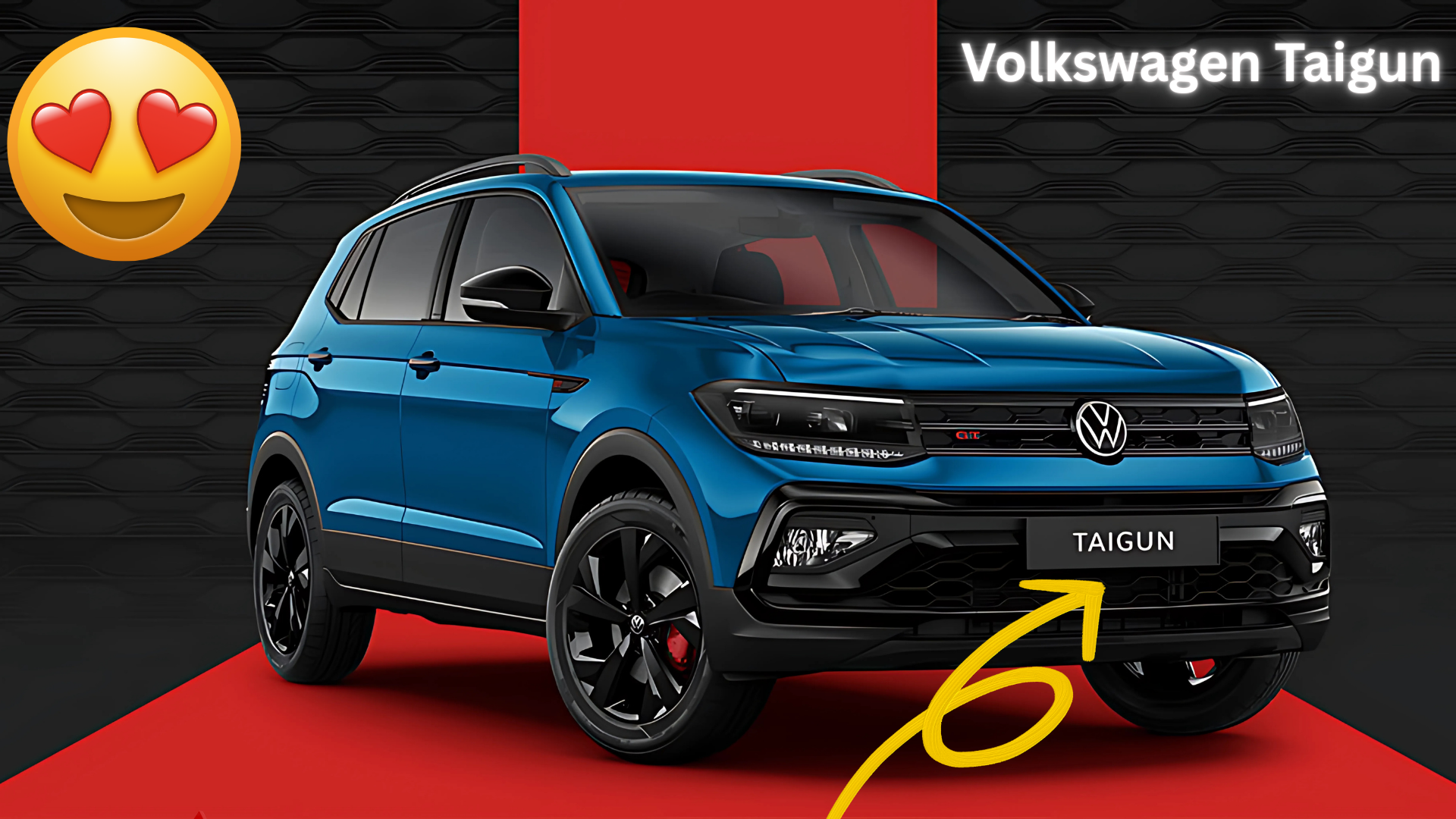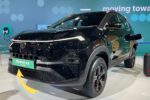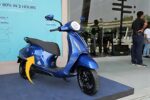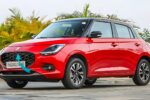Volkswagen Taigun: The Volkswagen Taigun’s exterior design showcases Volkswagen’s commitment to clean, understated elegance rather than flamboyant styling.
The front fascia features a bold chrome-accented grille that extends into the LED headlamps, creating a distinctive visual signature.
The squared wheel arches and sharp character lines along the sides convey strength and precision, while the rear section sports connected LED taillights that span the width of the vehicle, adding a touch of modernity.
Standing at 4,221mm in length, 1,760mm in width, and 1,612mm in height, the Taigun strikes a balanced stance on the road.
The 2,651mm wheelbase—among the longest in its segment—translates to generous interior space, particularly for rear passengers.
The 188mm ground clearance, while not class-leading, proves adequate for navigating typical Indian road conditions, including occasional unpaved surfaces and substantial speed breakers.
The attention to detail evident in the Taigun’s exterior design extends to elements like the chrome window surrounds, roof rails, and machined alloy wheels, which lend it a premium appearance.
Color options include vibrant choices like Curcuma Yellow and Rising Blue, alongside more conventional options, allowing buyers to either make a statement or maintain understated elegance according to their preference.
Volkswagen Taigun: Interior- Quality and Comfort in Equal Measure
Step inside the Taigun, and the Volkswagen family DNA becomes immediately apparent. The cabin design prioritizes ergonomics and functionality without sacrificing style.
The dashboard layout is clean and intuitive, with a driver-focused orientation that places essential controls within easy reach.
The use of high-quality materials throughout the cabin—soft-touch surfaces on frequently contacted areas, leatherette upholstery, and metallic accents—creates an ambiance that feels a class above many competitors.
The front seats offer excellent support with proper bolstering, making them comfortable for extended journeys.
The rear bench provides adequate thigh support and headroom, though three adults might find it somewhat snug for longer trips.
The panoramic sunroof available in higher variants enhances the sense of spaciousness, flooding the cabin with natural light.
Practicality hasn’t been overlooked, with numerous storage compartments distributed throughout the interior.
The 385-liter boot capacity may not lead the segment but accommodates weekend luggage for a family of four without difficulty. The 60:40 split rear seats can be folded to expand cargo space when needed, adding versatility.
Technology integration is comprehensive, centering around a 10-inch touchscreen infotainment system that supports wireless Apple CarPlay and Android Auto.
The digital instrument cluster, dubbed Virtual Cockpit, displays crucial information in a customizable, easily readable format.
Additional features include wireless phone charging, automatic climate control, connected car technology, and a premium sound system in higher variants.
Performance: The Heart of German Engineering
Under the hood, the Taigun offers two turbocharged petrol engine options—both embodying Volkswagen’s TSI (Turbocharged Stratified Injection) technology.
The entry-level 1.0-liter three-cylinder TSI engine produces 115 horsepower and 178 Nm of torque, while the more powerful 1.5-liter four-cylinder TSI EVO engine delivers 150 horsepower and 250 Nm of torque.
The 1.0 TSI can be paired with either a 6-speed manual or a 6-speed torque converter automatic transmission.
The 1.5 TSI EVO comes with either a 6-speed manual or a sophisticated 7-speed DSG (Direct-Shift Gearbox) dual-clutch automatic transmission, which provides remarkably quick and smooth shifts.
Both engines offer spirited performance, with the 1.0 TSI providing adequate pep for urban commutes and occasional highway runs.
The 1.5 TSI EVO, however, transforms the Taigun into a genuinely engaging performer capable of quick overtakes and comfortable high-speed cruising.
This larger engine also incorporates Active Cylinder Technology (ACT), which can deactivate two cylinders under light load conditions to improve fuel efficiency.
Speaking of efficiency, the 1.0 TSI returns approximately 18-19 km/l in ideal conditions, while the 1.5 TSI manages about 17-18 km/l despite its higher output—respectable figures considering the performance on offer.
Driving Dynamics: The Taigun’s Strongest Suit
Where the Taigun truly distinguishes itself from competitors is in its driving dynamics. The MQB-A0-IN platform provides an excellent foundation, offering impressive structural rigidity.
The suspension setup—McPherson struts up front and a torsion beam at the rear—is tuned to balance comfort and handling admirably.
The steering provides precise feedback, instilling confidence during cornering and high-speed maneuvers. Body roll is well-controlled, and the overall dynamics package makes the Taigun one of the most enjoyable vehicles to drive in its segment.
The braking system, featuring disc brakes at the front and drums at the rear, delivers progressive stopping power with good pedal feel.
Ride quality leans slightly toward the firmer side, especially at lower speeds over sharp imperfections, but it’s never uncomfortable.
As speeds increase, the suspension comes into its element, absorbing undulations with composed assurance. Road and wind noise insulation is commendable, contributing to a refined experience on longer journeys.
Safety: Prioritizing Protection
Safety remains a cornerstone of Volkswagen’s approach, and the Taigun reflects this philosophy. The underlying structure employs high-strength steel in critical areas to create a rigid safety cage.
Standard safety features across the range include dual front airbags, ABS with EBD, electronic stability control, hill-hold control, and rear parking sensors.
Higher variants add side and curtain airbags, bringing the total to six, along with a tire pressure monitoring system, rear camera, and an electronic differential lock system that improves traction on slippery surfaces.
ISOFIX child seat anchors come standard across the range, enhancing safety for younger passengers.
The Taigun has received a 5-star safety rating in Global NCAP crash tests, underscoring Volkswagen’s commitment to occupant protection regardless of variant level.
Market Positioning and Target Audience
The Taigun enters a fiercely contested segment dominated by established players like the Hyundai Creta, Kia Seltos, and Maruti Suzuki Grand Vitara.
Volkswagen has positioned the Taigun as a premium alternative that emphasizes driving pleasure, build quality, and safety without straying into luxury territory in terms of pricing.
This positioning targets discerning urban professionals and young families who value the driving experience and are willing to pay a slight premium for German engineering and brand prestige.
The Taigun appeals particularly to driving enthusiasts who need the practicality of an SUV but aren’t willing to compromise on dynamic capabilities.
Ownership Experience and After-Sales Support
Volkswagen has worked to address historical concerns about after-sales service and maintenance costs in India.
The Taigun comes with standard 4-year/100,000 km warranty, which can be extended to 7 years for additional peace of mind.
Service intervals are set at 15,000 km or one year, reducing the frequency of workshop visits compared to some competitors.
The company has expanded its service network and introduced more transparent service pricing structures. Additionally, the MQB-A0-IN platform was developed with increased localization of components, which should theoretically reduce spare part costs and service expenses over time.
Volkswagen Taigun: A Compelling European Alternative
The Volkswagen Taigun represents a thoughtfully executed entry into India’s compact SUV segment.
It brings distinctive German design philosophy, exceptional build quality, and engaging driving dynamics to a market that often prioritizes features and space above all else.
While it may not offer the longest feature list at its price point, the Taigun compensates with tangible quality attributes that become apparent over extended ownership.
For buyers who value driving pleasure, safety, and long-term durability, the Taigun makes a compelling case.
It successfully combines Volkswagen’s global standards with adaptations necessary for Indian conditions, resulting in a product that feels premium without being inaccessible.
Challenges remain, particularly in the form of established competitors with stronger brand equity in the SUV segment and wider service networks.
However, the Taigun’s distinctive character provides Volkswagen with a solid foundation to build upon in one of the world’s most promising automotive markets.
As India’s automotive landscape continues to evolve, with consumers becoming increasingly sophisticated in their preferences, products like the Taigun that offer substance beyond specifications sheets are likely to find their audience.
The Taigun may not dominate sales charts, but it successfully delivers on its promise of bringing German engineering excellence to India’s roads in an accessible format—and that alone makes it a significant addition to the segment.



